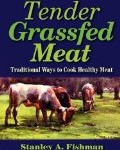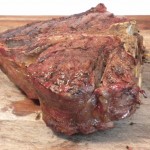Why Taste Enhancers Should Be Avoided and How to Do It
By Stanley A. Fishman, author of Tender Grassfed Meat and Tender Grassfed Barbecue
What if the food you ate was spiked with a chemical that caused you to have hallucinations? A chemical that distorted what you saw to the extent that you could not trust your eyes, because the chemical was causing your brain to see things that were not there? A chemical that caused you to see things the manufacturer and seller wanted you to see?
Would you object to such a chemical? Would you want such a deceptive chemical banned from the food supply?
Almost every person would. After all, we need to be able to trust what we see with our own eyes, to get accurate information from our senses. Yet you almost certainly have ingested many chemicals designed to deceive and trick your senses. Except the sense they deceive is not your eyesight, but your taste.
These chemicals are known as taste enhancers. If they appear on a food label at all (and they often do not), they can be called artificial flavors, or a host of other names.
The purpose of these chemicals is to trick your mind into believing it is eating something that is not there. Since our sense of taste serves many important functions, these functions are also deceived by this false information, and cannot function accurately. These chemicals have one purpose, to get you to buy the product they are placed in.
The Importance of Taste
We have over ten thousand taste buds in our mouths and tongue. They are there for a reason. The reasons include these:
- To detect poison
- To detect food that is good to eat
- To detect spoiled food
- To detect the presence of nutrients in a particular food
- To signal the digestive system so it can properly prepare to digest the food that is coming
- To stimulate the production of and release of saliva with the right mix of enzymes to predigest the food as we chew it
- To regulate our appetite
- To let us know when we have had enough
There are many other functions, almost certainly including functions we have not yet discovered. An accurate sense of taste is vital to our knowing what and how much to eat. For most of human history, we could trust our sense of taste. It protected us from harm, and provided the best possible feedback on how much we should eat.
I consider it crucial to have accurate taste feedback at all times. If the natural taste of something is really bad, or even a bit off, our body is telling us not to eat it. If the natural taste of something is really good, our body is telling us that we need the nutrients in that food, and to keep eating it. If we have eaten enough of a particular food, the taste changes, and we know when we have had enough.
For example, the first bite of a perfectly cooked grassfed steak will make me want to eat more, as it tastes so good. But after I have swallowed the nutrients that I need, the steak no longer tastes as good. My body is letting me know that I have had enough. If I were to force myself to eat more, the taste would become worse and worse. This is nature’s way of letting us know when we need to eat more of something, and when we need to eat less. If you eat only real food, cooked with the traditions of our ancestors, your sense of taste should work properly to let you know what to eat and how much. Since every one of us is unique, this is much more useful, in my opinion, than “one size fits all” nutritional guidelines.
But if you eat food spiked with taste enhancing chemicals, it is a different story.
The Trouble with Taste Enhancers
The first widespread flavor enhancer was Monosodium Glutamate, also known as MSG, which was invented in Japan. During World War II, American soldiers eating captured Japanese rations were astonished by how good they tasted. This lead to the widespread use of MSG in the American food industry, and to the creation of many other flavor enhancers.
Taste enhancers work on a neurological level, which means that they deceive the senses and directly affect the brain. Some make food appear to taste much better than it actually does. Others fool your brain and body into thinking you are eating meat, even when you are not. Others convince your brain that you are experiencing a particular taste, but you are not. This gives false information to your body and brain, and your natural functions act according to this false information. There are literally hundreds, perhaps thousands, of chemical combinations that are used to enhance and create taste in processed foods, and in fast foods. They are created and modified by skilled chemists who are trying to create a particular taste or effect. Unfortunately, these chemists are very good at their jobs.
Why are taste enhancers used? To enhance profits. Processed foods and factory foods are designed for long shelf life. They often contain many ingredients whose natural taste is foul and revolting to humans. They are processed, often heavily, to remove these foul tastes, and often have very little flavor. Tasteless foods often contain fewer nutrients than tasty foods. If the flavor was not enhanced to be better, much better than it naturally is, very few people would eat these products, because they just would not taste good enough. While giving a false good taste to inferior processed foods is a major reason for the use of taste enhancers, it is not the only one.
Taste enhancers can get you to eat more and more of a particular food. They do this by sending false information to your brain that makes you believe that you want to eat more and more of the food they are added to. The problem is made even worse by the poor nutritional content of factory and packaged foods, which makes your body hungry for nutrients which are not there. This combination is one explanation why so many people will eat a whole bag of cookies, or pint of ice cream, or huge amounts of soft drinks, cereal, fast foods, and any number of other factory foods. Obviously, if people eat more and more of a product, profits are enhanced. Getting us to eat much more food than we actually need is a big key to the profits of the food industry. These chemicals can be so effective that they totally override the natural appetite control built into our sense of taste.
A third and related use is to get our brains to crave a particular product. If you crave a particular fast food item, or packaged food, what you really crave is the chemicals used to enhance its taste. I still have a craving for a particular fast food item. I have had that item only once in the last ten years, yet I still crave it. When I ate it, I wanted to eat more and more of it, no matter how much I had. I tried it a few months ago, just to see what would happen. I ordered a small amount, which I quickly wolfed down, much faster than I intended. I immediately wanted to eat more, and more. It took a lot of willpower to leave the place. When I researched the contents of that particular food, I found that it contained several chemical taste enhancers.
The biggest problem with taste enhancers is that they deceive our sense of taste, and reduces its ability to perform its natural functions. Which means that the ability of our sense of taste to prevent us from eating foods that we should not, and to regulate our appetite, is greatly diminished.
The Solution
It takes work, but there are great benefits to avoiding chemicals, eating real food, and helping your body function as it was intended to do. It has made a huge difference in my life, giving me much more harmony, joy, and health. And my sense of taste has improved steadily, greatly increasing my appreciation of the food I eat. And I eat much less than I used to, without effort.
The only way I have found to restore my sense of taste to its proper function is to avoid taste enhancers. This means avoiding all packaged foods, except certain organic items. Even then, I read every label and reject everything that has an ingredient with a scientific or chemical name, or includes the words “flavors,†or “spices.†There are some wonderful traditional fermented foods out there, but I will only buy from a company that I have checked out and trust. To the extent that I can, I cook everything from scratch. I do my best to obtain foods that have been raised without chemicals, and which are traditionally raised on good soil.
I use traditional cooking methods and ingredient combinations. I only eat grassfed meats, or in the case of pork or poultry, meats that are pastured or naturally raised. I generally avoid most restaurants, and I am very careful to know the food of the few restaurants I will eat in. I never eat fast food, except for that experiment I described above.
What if you do not know how to cook? I respectfully advise you to learn. I think cooking is one of the most important skills anyone can have, as it gives you the freedom and ability to eat and prepare food that will be wonderful for you and your loved ones. And, given that we are what we eat, what could be more important?
Is all of this a lot of trouble and work? You bet it is. But it is worth it. Convenience was and is the great temptation that convinced most of us to rely on packaged foods and factory foods. The work of obtaining good food and the work of preparing and cooking them allows my sense of taste to function properly. I eat much less, though I eat as much as I want. I feel content and renewed after every home-cooked meal. I enjoy my meals without any negative consequences. And eating this way has resulted in the best health of my life, by far, as my natural functions work as intended, without being deceived by chemicals.
This post is part of Monday Mania, Fat Tuesday, Real Food Wednesday and Fight Back Friday blog carnivals.


 Photos of recipes from the new book Tender Grassfed Barbecue
Photos of recipes from the new book Tender Grassfed Barbecue
 Photos of recipes from the cookbook Tender Grassfed Meat
Photos of recipes from the cookbook Tender Grassfed Meat
